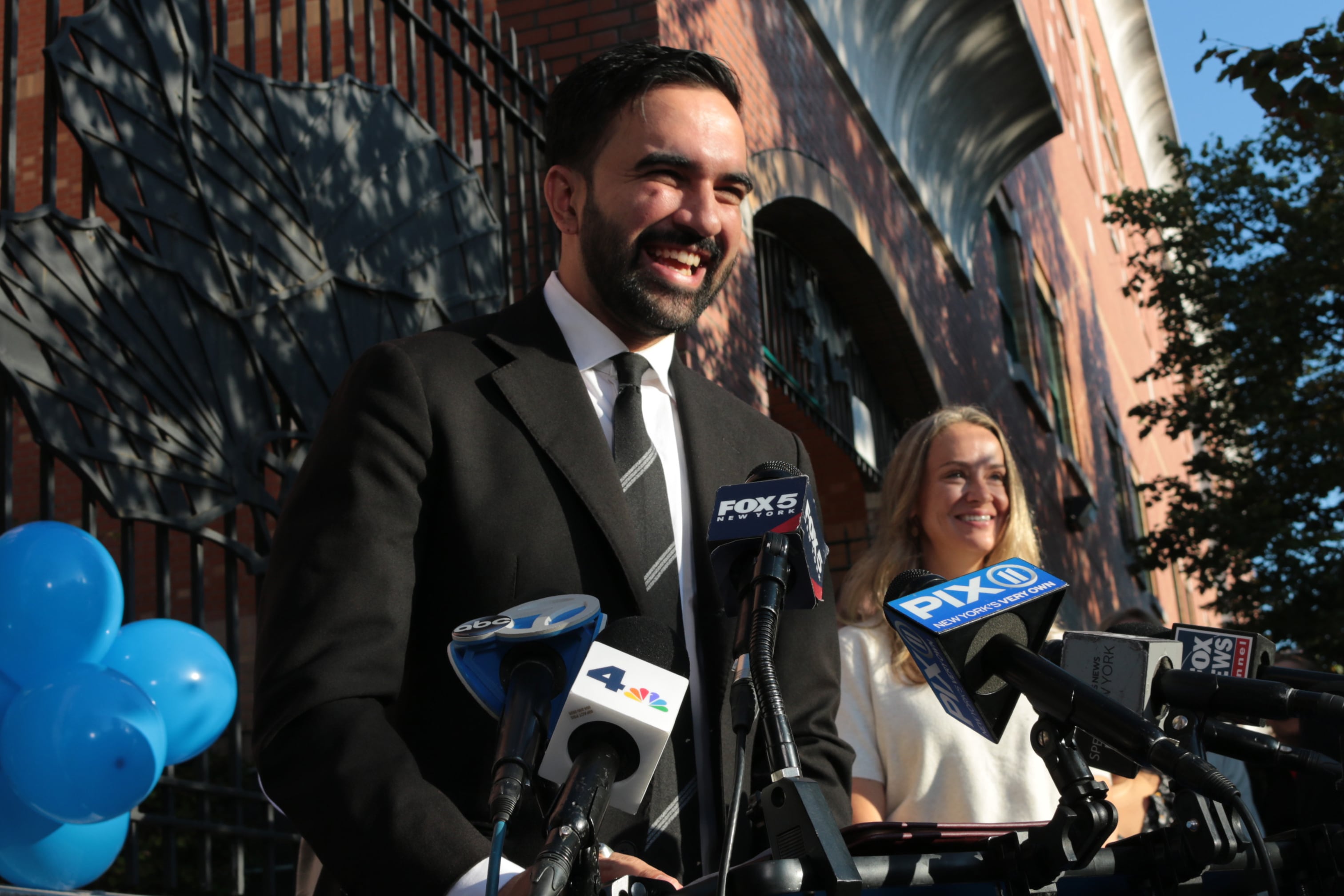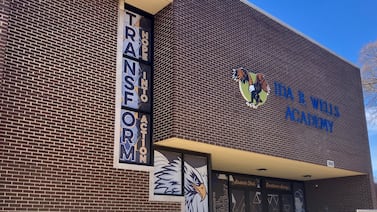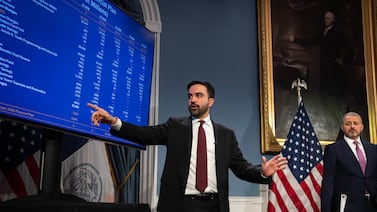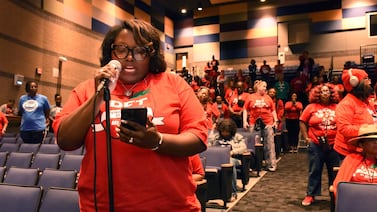Sign up for Chalkbeat New York’s free daily newsletter to get essential news about NYC’s public schools delivered to your inbox.
On the first day of school, Zohran Mamdani stood in front of a middle school in Queens with the president of the teachers union and expressed enthusiastic support for a state mandate to reduce class sizes and a new law banning cellphones in school.
But, when asked by a reporter, he struggled to lay out how his administration would improve the city’s highest-need schools if he wins in November.
Education has not been a focal point in the election, even though the school system is the city’s largest department and commands a budget of more than $41 billion with roughly 146,000 employees. Mamdani, a 33-year-old Queens assemblyman who won the Democratic primary, devoted a single 168-word paragraph to K-12 education on his campaign website.
Pressed on his plans to improve schools on Thursday, Mamdani did not outline any specific policy initiatives. He emphasized the importance of funding and criticized his leading opponent, former Gov. Andrew Cuomo, who is running as an independent.
“One of the first fights that I was a part of in Albany was the fight to fulfill the Campaign for Fiscal Equity and to actually start to fully fund our public schools, which was a fight that had the opposition of then Gov. Andrew Cuomo,” Mamdani said, referring to a long-running legal battle over whether the state adequately funded its schools.
He vowed to root out nepotism and “look line by line at every single position” in the Education Department bureaucracy to ensure that they are “actually working towards the betterment of the system” — a promise similar to the one Mayor Eric Adams’ administration made before taking office four years ago.
Mamdani also committed to cut down on wasteful spending and consider input from educators.
“Amidst all of the contracting and consulting that we pay for through [the Education Department], we know that there’s immense amount that can be saved … and through an understanding that when you are procuring curricula, it may actually be worth your time to speak to some of the teachers who then have to teach that curriculum,” Mamdani added.
His administration would “redirect that funding back straight into that classroom,” he said. “That has been a large focus of how we are envisioning what it will look like to run the largest school system in the United States.”
To several education advocates and observers, the response underscored that Mamdani has largely stuck to broad promises to invest in schools rather than advancing detailed ideas about what those investments should look like.
“As a leader, putting forward a vision of education to be held accountable to is really important,” said Jonathan Collins, a professor of political science and education at Columbia University Teachers College. He added: “It’s September — the runway is getting shorter.”
Asked if he plans to release a more detailed agenda for K-12 schools before the election, Mamdani did not commit to doing so.
“We are continuing to develop policy,” he said.
The next mayor will inherit a school system that faces many pressing challenges, including elevated rates of chronic absenteeism, falling enrollment, and reading and math proficiency rates that cleave along lines of race and class.
Adams has focused on overhauling reading and math instruction and expanding career education programs. His reelection campaign is widely considered to be a long shot, leaving the next mayor to decide whether to continue those efforts.
Mamdani’s education agenda includes ending the current system of mayoral control of the Education Department in favor of an approach that includes more community voice, though he has not shared details about his vision for changing the governance system. He also favors mental health support and school integration.
The city’s teachers union refrained from endorsing in the Democratic primary due to rifts between educators over the candidates’ positions on Israel and whether to prioritize prior executive experience. The union later endorsed Mamdani for the general election.
Cuomo has offered a lengthier set of education proposals, including an effort to replace low-performing schools with other models such as charters, which are publicly funded but privately managed.
“While I don’t necessarily align with everything in Cuomo’s platform, there is more of a detailed platform for sure,” said Matt Gonzales, a member of New Yorkers for Racially Just Public Schools, an advocacy group that plans to soon put out a policy roadmap that it hopes the mayoral candidates will embrace. (Gonzales said he was not speaking on behalf of the organization.)
Gonzales applauded Mamdani’s focus on school funding and affordable child care, and he said the mayoral frontrunner could help define a progressive vision for schools as the Trump administration attacks diversity, equity, and inclusion programs.
“There’s an opportunity for not just Mamdani, but others who are trying to lead cities and states, about what a diverse, inclusive education system should look like,” he said. “There is no [Democratic party] vision for public education.”
Alex Zimmerman is a reporter for Chalkbeat New York, covering NYC public schools. Contact Alex atazimmerman@chalkbeat.org.






